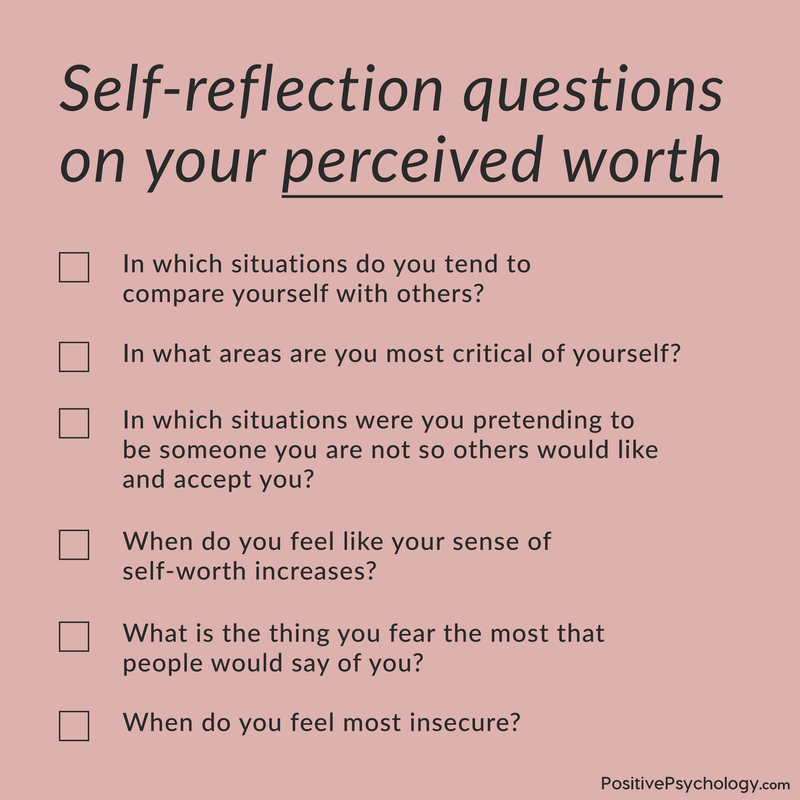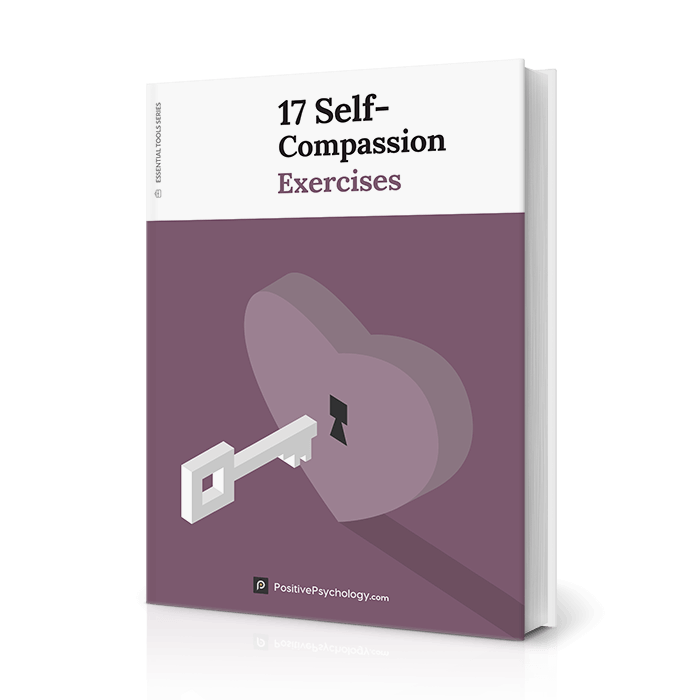What is Self-Worth & How Do We Build it? (Incl. Worksheets)
 Chances are, you’ve heard of the many, many “self-” words.
Chances are, you’ve heard of the many, many “self-” words.
There’s self-esteem, self-compassion, self-acceptance, self-respect, self-confidence, self-love, self-care, and so on.
There are so many words to describe how we feel about ourselves, how we think about ourselves, and how we act toward ourselves. It’s understandable if they all start to blend together for you; however, they are indeed different concepts with unique meanings, findings, and purposes.
Read on to learn more about what may be the most vital “self-” concept of them all: self-worth.
Before you read on, we thought you might like to download our three Self-Compassion Exercises for free. These detailed, science-based exercises will not only help you show more compassion and kindness to yourself but will also give you the tools to help your clients, students or employees improve their self-compassion and realize their worth.
This Article Contains:
- What Is the Meaning of Self-Worth and Self-Value?
- The Psychology of Self-Worth
- What Is Self-Worth Theory?
- What Determines Self-Worth?
- 3 Examples of Healthy Self-Worth
- How to Find Self-Worth and Value Yourself More
- The Importance of Self-Worth in Relationships
- The Risks of Tying Your Self-Worth to Your Job
- The Self-Worth Scale
- 5 Activities and Exercises for Developing Self-Worth
- 2 Worksheets That Help Increase Self-Worth
- Meditations to Boost Self-Worth
- Recommended Books on Self-Worth
- Must-Watch TED Talks and YouTube Videos
- 12 Quotes on Self-Worth
- A Take-Home Message
- References
What Is the Meaning of Self-Worth and Self-Value?
Self-worth and self-value are two related terms that are often used interchangeably. Having a sense of self-worth means that you value yourself, and having a sense of self-value means that you are worthy. The differences between the two are minimal enough that both terms can be used to describe the same general concept.
However, we’ll provide both definitions so you can see where they differ.
Self-worth is defined by Merriam-Webster as:
“a feeling that you are a good person who deserves to be treated with respect”.
On the other hand, self-value is “more behavioral than emotional, more about how you act toward what you value, including yourself, than how you feel about yourself compared to others” (Stosny, 2014).
Self-Worth versus Self-Esteem
Similarly, there is not a huge difference between self-worth and self-esteem, especially for those who are not professionals in the field of psychology. In fact, the first definition of self-worth on the Merriam-Webster dictionary website is simply “self-esteem.”
Similarly, the World Book Dictionary definition of self-esteem is “thinking well of oneself; self-respect,” while self-worth is defined as “a favorable estimate or opinion of oneself; self-esteem” (Bogee, Jr., 1998).
Clearly, many of these terms are used to talk about the same ideas, but for those deeply immersed in these concepts, there is a slight difference. Dr. Christina Hibbert explains this:
“Self-esteem is what we think and feel and believe about ourselves. Self-worth is recognizing ‘I am greater than all of those things.’ It is a deep knowing that I am of value, that I am loveable, necessary to this life, and of incomprehensible worth.” (2013).
Self-Worth versus Self-Confidence
In the same vein, there are subtle but significant differences between self-worth and self-confidence.
Self-confidence is not an overall evaluation of yourself, but a feeling of confidence and competence in more specific areas. For example, you could have a high amount of self-worth but low self-confidence when it comes to extreme sports, certain subjects in school, or your ability to speak a new language (Roberts, 2012).
It’s not necessary to have a high sense of self-confidence in every area of your life; there are naturally some things that you will simply not be very good at, and other areas in which you will excel. The important thing is to have self-confidence in the activities in your life that matter to you and a high sense of self-worth overall.
We explore this further in The Science of Self-Acceptance Masterclass©.
The Psychology of Self-Worth

Self-worth is at the core of our very selves—our thoughts, feelings, and behaviors are intimately tied into how we view our worthiness and value as human beings.
What Is the Self-Worth Theory?
The self-worth theory posits that an individual’s main priority in life is to find self-acceptance and that self-acceptance is often found through achievement (Covington & Beery, 1976). In turn, achievement is often found through competition with others.
Thus, the logical conclusion is that competing with others can help us feel like we have impressive achievements under our belt, which then makes us feel proud of ourselves and enhances our acceptance of ourselves.
The theory holds that there are four main elements of the self-worth model:
- Ability;
- Effort;
- Performance;
- Self-worth.
The first three interact with each other to determine one’s level of self-worth. One’s ability and effort predictably have a big impact on performance, and all three contribute to one’s feeling of worth and value.
While this theory represents a good understanding of self-worth as we tend to experience it, it is unfortunate that we place so much emphasis on our achievements. Aside from competing and “winning” against others, there are many factors that can contribute to our sense of self-worth.
What Determines Self-Worth?

However, people commonly use other yardsticks to measure their self-worth. Here are five of the top factors that people use to measure and compare their own self-worth to the worth of others:
- Appearance—whether measured by the number on the scale, the size of clothing worn, or the kind of attention received by others;
- Net worth—this can mean income, material possessions, financial assets, or all of the above;
- Who you know/your social circle—some people judge their own value and the value of others by their status and what important and influential people they know;
- What you do/your career—we often judge others by what they do; for example, a stockbroker is often considered more successful and valuable than a janitor or a teacher;
- What you achieve—as noted earlier, we frequently use achievements to determine someone’s worth (whether it’s our own worth or someone else’s), such as success in business, scores on the SATs, or placement in a marathon or other athletic challenge (Morin, 2017).
Author Stephanie Jade Wong (n.d.) is on a mission to correct misunderstandings and misperceptions about self-worth. Instead of listing all the factors that go into self-worth, she outlines what does not determine your self-worth (or, what should not determine your self-worth):
- Your to-do list: Achieving goals is great and it feels wonderful to cross off things on your to-do list, but it doesn’t have a direct relationship with your worth as a human;
- Your job: It doesn’t matter what you do. What matters is that you do it well and that it fulfills you;
- Your social media following: It also doesn’t matter how many people think you are worthy of a follow or a retweet. It can be enlightening and healthy to consider the perspectives of others, but their opinions have no impact on our innate value;
- Your age: You aren’t too young or too old for anything. Your age is simply a number and does not factor into your value as a human being;
- Other people: As noted above, it doesn’t matter what other people think or what other people have done or accomplished. Your personal satisfaction and fulfillment are much more important than what others are thinking, saying, or doing;
- How far you can run: Your mile run time is one of the least important factors for your self-worth (or for anything else, for that matter). If you enjoy running and feel fulfilled by improving your time, good for you! If not, good for you! Your ability to run does not determine your self-worth;
- Your grades: We all have different strengths and weaknesses, and some of us are simply not cut out for class. This has no bearing on our value as people, and a straight-A student is just as valuable and worthy as a straight-F student or a dropout;
- The number of friends you have: Your value as a human has absolutely nothing to do with how many friends or connections you have. The quality of your relationships is what’s really important;
- Your relationship status: Whether flying solo, casually dating, or in a committed relationship, your value is exactly the same—your relationship status doesn’t alter your worth;
- The money (or lack thereof) in the bank: If you have enough money to physically survive (which can, in fact, be $0), then you have already achieved the maximal amount of “worth” you can get from money (hint: it’s 0!);
- Your likes: It doesn’t matter if you have “good taste” or not, if your friends and acquaintances think you’re sophisticated, or if you have an eye for the finer things. Your worth is the same either way.
- Anything or anyone but yourself: Here we get to the heart of the matter—you are the only one who determines your self-worth. If you believe you are worthy and valuable, you are worthy and valuable. Even if you don’t believe you are worthy and valuable, guess what—you still are worthy and valuable!
“If I succeed at this, I will feel more valuable as a person.”
Have you ever had a similar thought? You are certainly not alone. While objectively, your worth is not conditional on anything, most of us constantly evaluate our worth as human beings.
Blascovich and Tomaka (1991) describe self-esteem as the extent to which an individual evaluates themselves favorably. Consequently, the core process underlying self-esteem is self-evaluation, and people use many standards and domains to determine their worthiness (Crocker & Wolfe, 2001).
Domains represent the areas where people believe success means that they are wonderful or worthwhile, and failure means that they are worthless (Crocker & Wolfe, 2001).
For example, the self-worth of person A may be greatly determined by academic performance, while the self-worth of person B may be determined mainly by appearance.
Noticing the domains your use as a frame of reference to determine your self-worth is the first step toward developing more unconditional self-acceptance. The self-reflection questions shared below explore created conditions used to determine ‘worthiness’ and later lead beyond these conditions.
Note that there is a difference between evaluating actions and evaluating personal worth. We can learn from our mistakes and grow as individuals by assessing our efforts. However, by evaluating our personal worth, we can threaten our wellbeing.

3 Examples of Healthy Self-Worth
You might be thinking, “Okay, I know what does and doesn’t (and shouldn’t) determine self-worth, but what does healthy self-worth really look like?”
Given what we know about the determinants of self-worth, let’s read through a few examples.
Bill is not a great student. He gets mostly Bs and Cs, even when he spends a great deal of time studying. He didn’t get a great score on his SATs, and he’s an average reader, a struggling writer, and nobody’s idea of a mathematician.
Even though Bill wishes he had better grades, he still feels pretty good about himself. He knows that grades aren’t everything and that he’s just as valuable a person as his straight-A friends. Bill has a high sense of self-worth and a realistic view of himself and his abilities.
Next, let’s consider Amy. Amy has a wide variety of interests, including marathons, attending book club, playing weekly trivia with her friends, and meeting new people.
Amy’s not particularly good at running and has never placed in a marathon. She’s a slow reader and frequently misses the symbolism and themes that her fellow book club members pick up on. She only answers about 10% of the trivia questions correctly and leans on her friends’ knowledge quite often. Finally, she loves to talk to new people but sometimes she gets blown off and ignored.
Despite all of this, she still believes that she is worthy and valuable. She knows that her worth as a human is not dependent on her ability to run, read, play trivia, or make new friends. Whether she is great, terrible, or somewhere in between at each of her vast range of chosen activities, she knows she is still worthy of happiness, fulfillment, and love.
Finally, consider the case of Marcus. Marcus is an excellent salesman and frequently outsells most of the other people at his company, but one coworker seems to always be just a bit ahead of him. He is also an avid squash player and frequently competes in tournaments. Sometimes he gets first or second place, but usually he does not place at all.
Even though he is not the best at his job or at his favorite hobby, Marcus still feels that he is valuable. He thinks he is smart, talented, and successful, even though he’s not the smartest, most talented, or most successful, and he’s okay with that.
Bill, Amy, and Marcus all have healthy levels of self-worth. They have varying levels of abilities and talents, and they get a wide range of results from their efforts, but they all understand that what they do is not who they are. No matter whether they win awards or garner accolades for their performance or not, they still have the same high opinion of their value as a person.
How to Find Self-Worth and Value Yourself More

There are things you can do to boost your sense of self-worth and ensure that you value yourself like you ought to be valued—as a full, complete, and wonderful human being that is deserving of love and respect, no matter what.
How to build self-worth in adolescents
As with most lifelong traits, it’s best to start early. If you know any adolescents, be sure to encourage them to understand and accept their own self-worth. Reinforce their value as a being rather than a “doing,” as some say—in other words, make sure they know that they are valuable for who they are, not what they do.
If you need some more specific ideas on how to boost an adolescent’s self-worth, check out the suggestions below.
Researchers at Michigan State University recommend two main strategies:
- Provide unconditional love, respect, and positive regard;
- Give adolescents opportunities to experience success (Clark-Jones, 2012).
Showing a teen unconditional love (if you’re a parent, family member, or very close friend) or unconditional respect and positive regard (if you’re a teacher, mentor, etc.) is the best way to teach him self-worth.
If you show a teenager that you love and appreciate her for exactly who and what she is, she will learn that it’s okay to love herself for exactly who and what she is. If you demonstrate that she doesn’t need to achieve anything to earn your love and respect, she’ll be much less likely to put unnecessary parameters on her own self-love and self-respect.
Further, one way in which we gain a healthy sense of self-worth is through early and frequent experiences of success. Successful experiences boost our sense of competency and mastery and make us feel just plain good about ourselves.
Successful experiences also open the door for taking healthy risks and the success that often follows. Don’t just tell a teen that she is worthy and valuable, help her believe it by giving her every opportunity to succeed.
Just be sure that these opportunities are truly opportunities for her to succeed on her own—a helping hand is fine, but we need to figure out how to do some things on our own to build a healthy sense of self-worth (Clark-Jones, 2012).
How to increase self-worth and self-value in adults
It’s a bit trickier to increase self-worth and self-value in adults, but it’s certainly not a lost cause. Check out the two tips below to learn how to go about it.
First, take a look back at the list of what does not determine self-worth. Remind yourself that your bank account, job title, attractiveness, and social media following have nothing to do with how valuable or worthy a person you are.
It’s easy to get caught up in chasing money, status, and popularity—especially when these things are highly valued by those around us and by society in general—but make an effort to take a step back and think about what truly matters when determining people’s worth: their kindness, compassion, empathy, respect for others, and how well they treat those around them.
Second, work on identifying, challenging, and externalizing your critical inner voice. We all have an inner critic that loves to nitpick and point out our flaws (Firestone, 2014). It’s natural to let this inner critic get the best of us sometimes, but if we let her win too often she starts to think that she’s right!
Whenever you notice your inner critic start to fire up with the criticisms, make her pause for a moment. Ask yourself whether she has any basis in fact, whether she’s being kind or not, and whether what she’s telling you is something you need to know. If none of those things are true, feel free to tell her to see herself out!
Challenge her on the things she whispers in your ear and remind her that no matter what you do or don’t do, you are worthy and valuable all the same.
For more specific activities and ideas, see the exercises, activities, and worksheets we cover later in this piece.
The Importance of Self-Worth in Relationships

It’s an understandable tendency to let someone else’s love for you encourage you to feel better about yourself. However, you should work on feeling good about yourself whether you are in a relationship or not.
The love of another person does not define you, nor does it define your value as a person. Whether you are single, casually seeing people, building a solid relationship with someone, or celebrating your 30th wedding anniversary with your spouse, you are worthy of love and respect, and you should make time to practice self-acceptance and self-compassion.
This is true for people of any relationship status, but it may be especially important for those in long-term relationships.
Don’t make the mistake of thinking that your partner’s love is what makes you worthy of love. If anything ever happens to your partner or to your relationship, you don’t want to be forced to build up your sense of worth from scratch. It can make breakups and grief much harder than they need to be.
Although this facet of the issue might be enough to encourage you to work on your self-worth, there’s another reason it’s important: Having a healthy sense of self-worth will actually make your current relationship better too.
When you learn to love yourself, you become better able to love someone else. People with high self-respect tend to have more satisfying, loving, and stable relationships than those who do not, precisely because they know that they need to first find their worth, esteem, and happiness within themselves.
Two people who are lit with self-worth and happiness from within make are much brighter than two people who are trying to absorb light from each other (Grande, 2018).
The Risks of Tying Your Self-Worth to Your Job
Similar to the dangers of anchoring your self-worth to someone else, there are big risks in tying your self-worth to your job. Like a significant other, jobs can come and go—sometimes without warning.
You can be let go, laid off, transitioned, dehired, dismissed, downsized, redirected, released, selectively separated, terminated, replaced, asked to resign, or just plain fired. You could also be transferred, promoted, demoted, or given new duties and responsibilities that no longer mesh with the sense of self-worth your previous duties and responsibilities gave you.
You could also quit, take a new job, take some time off, or retire—all things that can be wonderful life transitions, but that can be unnecessarily difficult if you base too much of your self-worth on your job.
As noted earlier, your job is one of the things that don’t define you or your worth. There’s nothing wrong with being proud of what you do, finding joy or fulfillment in it, or letting it shape who you are; the danger is in letting it define your entire sense of self.
We are all so much more than a job. Believing that we are nothing more than a job is detrimental to our wellbeing and can be disastrous in times of crisis.
The Self-Worth Scale

If so, you’re in luck. There is a scale that is perfectly suited for this curiosity.
Also known as the Contingencies of Self-Worth Scale, this scale was developed by researchers Crocker, Luhtanen, Cooper, and Bouvrette in 2003. It consists of 35 items that measure self-worth in seven different domains. These seven domains, with an example item from each domain, are:
- Approval from others (i.e., I don’t care if other people have a negative opinion of me);
- Physical appearance (i.e., my self-esteem is influenced by how attractive I think my face or facial features are);
- Outdoing others in competition (i.e., my self-worth is affected by how well I do when I am competing with others);
- Academic competence (i.e., I feel bad about myself whenever my academic performance is lacking);
- Family love and support (i.e., my self-worth is not influenced by the quality of my relationships with my family members);
- Being a virtuous or moral person (i.e., my self-esteem depends on whether or not I follow my moral/ethical principles);
- God’s love (i.e., my self-esteem would suffer if I didn’t have God’s love).
Each item is rated on a scale from 1 (strongly disagree) to 7 (strongly agree). Once you have rated each item, sum the answers to the five items for each domain and divide the total by 5 for the sub-scale score.
To learn more about this scale or use it to determine your own self-worth, click here.
5 Activities and Exercises for Developing Self-Worth
According to author and self-growth guru Adam Sicinski, there are five vital exercises for developing and maintaining self-worth. He lays them out in five stages, but there’s no need to keep them in strict order; it’s fine to move back and forth or revisit stages.
1. Increase your self-understanding
An important activity on the road to self-worth is to build self-understanding. You need to learn who you are and what you want before you can decide you are a worthy human being.
Sicinski recommends this simple thought experiment to work on increasing your understanding of yourself:
- Imagine that everything you have is suddenly taken away from you (i.e., possessions, relationships, friendships, status, job/career, accomplishments and achievements, etc.);
- Ask yourself the following questions:
a. What if everything I have was suddenly taken away from me?
b. What if all I had left was just myself?
c. How would that make me feel?
d. What would I actually have that would be of value? - Think about your answers to these questions and see if you can come to this conclusion: “No matter what happens externally and no matter what’s taken away from me, I’m not affected internally”;
- Next, get to know yourself on a deeper level with these questions:
a. Who I am? I am . . . I am not . . .
b. How am I?
c. How am I in the world?
d. How do others see me?
e. How do others speak about me?
f. What key life moments define who I am today?
g. What brings me the most passion, fulfillment, and joy? - Once you have a good understanding of who you are and what fulfills and satisfies you, it’s time to look at what isn’t so great or easy about being you. Ask yourself these questions:
a. Where do I struggle most?
b. Where do I need to improve?
c. What fears often hold me back?
d. What habitual emotions hurt me?
e. What mistakes do I tend to make?
f. Where do I tend to consistently let myself down? - Finally, take a moment to look at the flipside; ask yourself:
a. What abilities do I have?
b. What am I really good at?
Spend some time on each step, but especially on the steps that remind you of your worth and your value as a person (e.g., the strengths step).
2. Boost your self-acceptance
Once you have a better idea of who you are, the next step is to enhance your acceptance of yourself.
Start by forgiving yourself for anything you noted in item 5 above. Think of any struggles, needs for improvement, mistakes, and bad habits you have, and commit to forgiving yourself and accepting yourself without judgment or excuses.
Think about everything you learned about yourself in the first exercise and repeat these statements:
- I accept the good, the bad and the ugly;
- I fully accept every part of myself including my flaws, fears, behaviors, and qualities I might not be too proud of;
- This is how I am, and I am at peace with that
3. Enhance your self-love
Now that you have worked on accepting yourself for who you are, you can begin to build love and care for yourself. Make it a goal to extend yourself kindness, tolerance, generosity, and compassion.
To boost self-love, start paying attention to the tone you use with yourself. Commit to being more positive and uplifting when talking to yourself.
If you’re not sure how to get started, think (or say aloud) these simple statements:
- I feel valued and special;
- I love myself wholeheartedly;
- I am a worthy and capable person (Sicinski, n.d.).
4. Recognize your self-worth
Once you understand, accept, and love yourself, you will reach a point where you no longer depend on people, accomplishments, or other external factors for your self-worth.
At this point, the best thing you can do is recognize your worth and appreciate yourself for the work you’ve done to get here, as well as continuing to maintain your self-understanding, self-acceptance, self-love, and self-worth.
To recognize your self-worth, remind yourself that:
- You no longer need to please other people;
- No matter what people do or say, and regardless of what happens outside of you, you alone control how you feel about yourself;
- You have the power to respond to events and circumstances based on your internal sources, resources, and resourcefulness, which are the reflection of your true value;
- Your value comes from inside, from an internal measure that you’ve set for yourself.
5. Take responsibility for yourself
In this stage, you will practice being responsible for yourself, your circumstances, and your problems.
Follow these guidelines to ensure you are working on this exercise in a healthy way:
- Take full responsibility for everything that happens to you without giving your personal power and your agency away;
- Acknowledge that you have the personal power to change and influence the events and circumstances of your life.
Remind yourself of what you have learned through all of these exercises, and know that you hold the power in your own life. Revel in your well-earned sense of self-worth and make sure to maintain it.
2 Worksheets That Help Increase Self-Worth

Check out the four worksheets below that can help you build your self-worth.
About Me Sentence Completion Worksheet
This worksheet outlines a simple way to build self-worth. It only requires a pen or pencil and a few minutes to complete. Feel free to use it for yourself or for your adult clients, but it was designed for kids and can be especially effective for them.
This worksheet is simply titled “About Me: Sentence Completion” and is exactly what you might expect: it gives kids a chance to write about themselves. If your youngster is too young to write down his own answers, sit with him and help him record his responses.
The sentence stems (or prompts) to complete include:
- I was really happy when . . .
- Something that my friends like about me is . . .
- I’m proud of . . .
- My family was happy when I . . .
- In school, I’m good at . . .
- Something that makes me unique is . . .
By completing these six prompts, your child will take some time to think about who he really is, what he likes, what he’s good at, and what makes him feel happy.
Self-Esteem Sentence Stems worksheet.
Self-Esteem Checkup
This worksheet is good for a wide audience, including children, adolescents, young adults, and older adults. The opening text indicates that it’s a self-esteem worksheet, but in this case, the terms self-esteem and self-worth are used interchangeably.
Completing this worksheet will help you get a handle on your personal sense of understanding, acceptance, respect, and love for yourself.
The worksheet lists 15 statements and instructs you to rate your belief in each one on a scale from 0 (not at all) to 10 (totally or completely). These statements are:
- I believe in myself;
- I am just as valuable as other people;
- I would rather be me than someone else;
- I am proud of my accomplishments;
- I feel good when I get compliments;
- I can handle criticism;
- I am good at solving problems;
- I love trying new things;
- I respect myself;
- I like the way I look;
- I love myself even when others reject me;
- I know my positive qualities;
- I focus on my successes and not my failures;
- I’m not afraid to make mistakes;
- I am happy to be me.
Add up all of the ratings for these 15 statements to get your total score, then rate your overall sense of self-esteem on a scale from 0 (I completely dislike who I am) to 10 (I completely like who I am).
Finally, respond to the prompt “What would need to change in order for you to move up one point on the rating scale? (i.e., for example, if you rated yourself a 6 what would need to happen for you to be at a 7?)”
Click here to preview this worksheet for yourself or click here to view it in a collection of self-esteem-building, small-group counseling lesson plans.
Meditations to Boost Self-Worth
If you’re a fan of meditations, check out the four options below. They’re all aimed at boosting self-worth:
- A Guided Meditation to Help Quiet Self-Doubt and Boost Confidence from Health.com;
- Guided Meditation for Inner Peace and Self-Worth from Linda Hall;
- Guided Meditation: Self-Esteem from The Honest Guys Meditations & Relaxations;
If you’re not fond of any of these four meditations, try searching for other guided meditations intended to improve your self-worth. There are many out there to choose from.
Recommended Books on Self-Worth
To learn more about self-worth and how to improve it, check out some of the most popular books about this subject on Amazon:
- The Gifts of Imperfection: Let Go of Who You Think You’re Supposed to Be and Embrace Who You Are by Dr. Brené Brown (Amazon);
- What to Say When You Talk to Your Self by Dr. Shad Helmstetter (Amazon);
- The 21-Day Self-Love Challenge: Learn How to Love Yourself Unconditionally, Cultivate Confidence, Self-Compassion & Self-Worth by Sophia Taylor (Amazon);
- Love Yourself: 31 Ways to Truly Find Your Self Worth & Love Yourself by Randy Young (Amazon);
- Self-Worth Essentials: A Workbook to Understand Yourself, Accept Yourself, Like Yourself, Respect Yourself, Be Confident, Enjoy Yourself, and Love Yourself by Dr. Liisa Kyle (Amazon);
- Learning to Love Yourself: Finding Your Self-Worth by Sharon Wegscheider-Cruse (Amazon).
Must-Watch TED Talks and YouTube Videos
If you’re more of a watcher than a reader, there are some great TED Talks and YouTube videos you can check out, including:
TED Talk: Meet Yourself: A User’s Guide to Building Self-Esteem by Niko Everett
In her talk, Niko Everett, the founder of the organization Girls for Change, discusses inspiring ways to build up your self-esteem.
TED Talk: Claiming Your Identity by Understanding Your Self-Worth by Helen Whitener
Judge Helen Whitener discusses self-worth through the lens of social justice and equality in this talk.
A Clever Lesson in Self Worth from Meir Kay
12 Quotes on Self-Worth
Sometimes all we need to kickstart or motivate us to work on our self-love and self-worth is a good, insightful quote. If that’s what you’re looking for, read on.
You yourself, as much as anybody in the entire universe, deserve your love and affection.
Buddha
A man cannot be comfortable without his own approval.
Mark Twain
Remember always that you not only have the right to be an individual, you have an obligation to be one.
Eleanor Roosevelt
Loving ourselves works miracles in our lives.
Louise L. Hay
The fact that someone else loves you doesn’t rescue you from the project of loving yourself.
Sahaj Kohli
Why should we worry about what others think of us, do we have more confidence in their opinions than we do our own?
Brigham Young
Don’t rely on someone else for your happiness and self-worth. Only you can be responsible for that. If you can’t love and respect yourself—no on else will be able to make that happen. Accept who you are—completely; the good and the bad—and make changes as YOU see fit—not because you think someone else want you to be different.
Stacey Charter
Your problem is you’re afraid to acknowledge your own beauty. You’re too busy holding onto your unworthiness.
Ram Dass
It’s surprising how many persons go through life without ever recognizing that their feelings toward other people are largely determined by their feelings toward themselves, and if you’re not comfortable within yourself, you can’t be comfortable with others.
Sidney J. Harris
Most of the shadows of this life are caused by standing in one’s own sunshine.
Ralph Waldo Emerson
It is never too late to be what you might have been.
George Eliot
Stay true to yourself. An original is worth more than a copy.
Suzy Kassem
A Take-Home Message
Self-worth is an important concept for both researchers and laymen to understand, and it’s especially important for us to be able to identify, build, and maintain a normal, healthy sense of self-worth.
Learning about self-worth can teach you how to be more happy and fulfilled in your authentic, loveable self.
What do you think is the most important takeaway from research on this topic? Do you think a lack of self-worth is a problem? Or perhaps you think an excess of self-worth is the bigger problem today? Let us know in the comments section.
We hope you enjoyed reading this article. Don’t forget to download our three Self Compassion Exercises for free.
- Blascovich, J., & Tomaka, J. (1991). Measures of self-esteem. Measures of Personality and Social Psychological Attitudes, 1, 115-160.
- Bogee, Jr., L. (1998). Leadership through personal awareness. University of Hawaii. Retrieved from http://www.hawaii.edu/intlrel/LTPA/selfwort.htm
- Clark-Jones, T. (2012). The importance of helping teens discover self-worth. Michigan State University – MSU Extension. Retrieved from http://www.canr.msu.edu/news/the_importance_of_helping_teens_discover_self-worth
- Covington, M. V., & Beery, R. G. (1976). Self-worth and school learning. Oxford, UK: Holt, Rinehart & Winston.
- Crocker, J., Luhtanen, R. K., Cooper, M. L., & Bouvrette, A. (2003). Contingencies of self-worth in college students: Theory and measurement. Journal of Personality and Social Psychology, 85, 894–908.
- Crocker, J., & Wolfe, C. T. (2001). Contingencies of self-worth. Psychological Review, 108(3), 593.
- Firestone, L. (2014). Essential tips for building true self-worth. Psych Alive. Retrieved from https://www.psychalive.org/self-worth/
- Grande, D. (2018). Building self-esteem and improving relationships. Psychology Today. Retrieved from https://www.psychologytoday.com/us/blog/in-it-together/201801/building-self-esteem-and-improving-relationships
- Hibbert, C. (2013). Self-esteem vs. self-worth. Dr. Christina Hibbert. Retrieved from https://www.drchristinahibbert.com/self-esteem-vs-self-worth/
- Morin, A. (2017). How do you measure your self-worth? Psychology Today. Retrieved from https://www.psychologytoday.com/us/blog/what-mentally-strong-people-dont-do/201707/how-do-you-measure-your-self-worth
- Roberts, E. (2012). The difference between self-esteem and self-confidence. Healthy Place. Retrieved from https://www.healthyplace.com/blogs/buildingselfesteem/2012/05/the-difference-between-self-esteem-and-self-confidence
- Sicinski, A. (n.d.). How to build self-worth and start believing in yourself again. IQ Matrix. Retrieved from https://blog.iqmatrix.com/self-worth
- Stosny, S. (2014). How much do you value yourself? Psychology Today. Retrieved from https://www.psychologytoday.com/us/blog/anger-in-the-age-entitlement/201406/how-much-do-you-value-yourself
- Wong, S. J. (n.d.). 13 things that don’t determine your self-worth. Shine. Retrieved from https://advice.shinetext.com/articles/12-things-that-dont-determine-your-self-worth/
Let us know your thoughts
Read other articles by their category
- Body & Brain (49)
- Coaching & Application (57)
- Compassion (26)
- Counseling (51)
- Emotional Intelligence (24)
- Gratitude (18)
- Grief & Bereavement (21)
- Happiness & SWB (40)
- Meaning & Values (26)
- Meditation (20)
- Mindfulness (45)
- Motivation & Goals (45)
- Optimism & Mindset (34)
- Positive CBT (29)
- Positive Communication (20)
- Positive Education (47)
- Positive Emotions (32)
- Positive Leadership (18)
- Positive Parenting (4)
- Positive Psychology (33)
- Positive Workplace (37)
- Productivity (17)
- Relationships (46)
- Resilience & Coping (36)
- Self Awareness (21)
- Self Esteem (38)
- Strengths & Virtues (32)
- Stress & Burnout Prevention (34)
- Theory & Books (46)
- Therapy Exercises (37)
- Types of Therapy (64)






What our readers think
So, you check the appropriate boxes in a worksheet you somehow develop self worth?
This was very helpful, thank you. It encapsulated a lot of topics I wanted to touch on during therapy. Well-researched and written 🙂 Especially love how you linked how most people who struggle with self-worth, struggle with relationships.